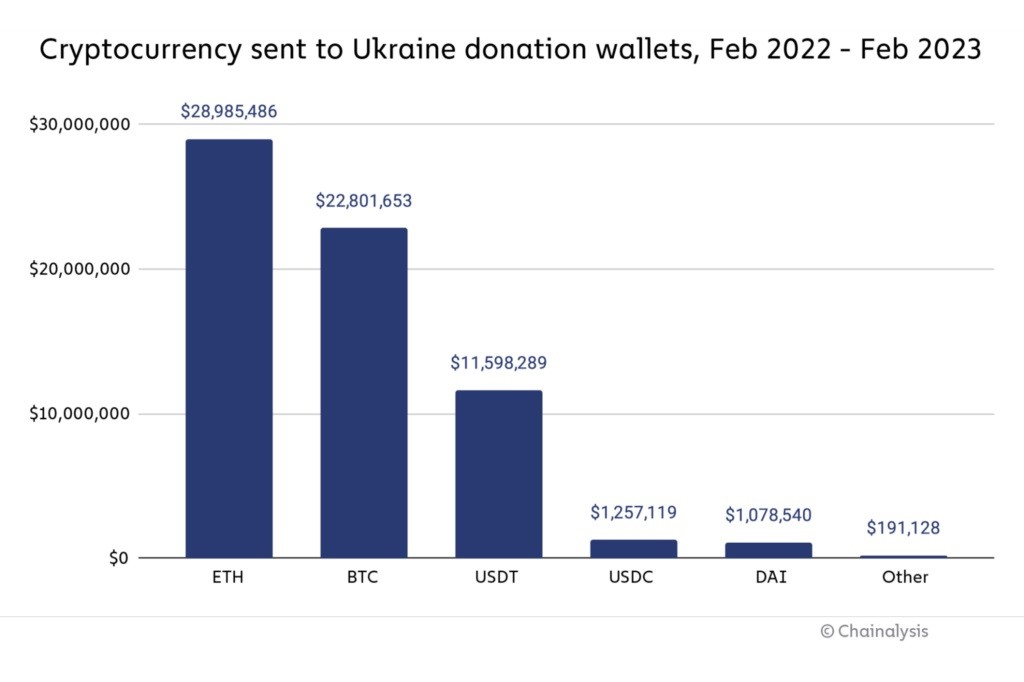Ukraine’s Government-Provided Crypto Addresses Raised $70 Million During War, Report

Crypto donations collected by the government in Kyiv since the start of the Russian invasion have amounted to almost $70 million, according to Chainalysis. Ether has been the most donated crypto followed by bitcoin and the stablecoin tether, the blockchain intelligence firm said in a report.
Ukraine Receives Millions of Dollars in Various Coins From the Global Crypto Community
The amount of cryptocurrency transferred to addresses published by the Ukrainian government to raise money for defense and other purposes has reached nearly $70 million, blockchain forensics firm Chainalysis revealed on the first anniversary of the conflict in the Eastern European nation.
The authorities in Kiev started accepting donations in digital currencies soon after Russia launched its invasion in late February 2022. In March, Chainalysis said that more than $56 million worth of cryptocurrencies had been donated to the wallets of the Ukrainian government.
Other digital donations have been made to addresses posted by charity organizations raising funds for their humanitarian efforts. According to a recent report by blockchain analytics company Elliptic, Ukraine supporters have sent a total of over $212 million in cryptocurrency.
“Although such donations pale in comparison to fiat donations, they demonstrate the philanthropy of cryptocurrency enthusiasts across the globe and Ukraine’s willingness to accept a wide variety of digital assets,” Chainalysis commented in its blog post. It also noted that the majority of donations were made in BTC and ETH, the leading cryptocurrencies by market capitalization.

The company pointed out that besides helping with military efforts, the donations can encourage crypto adoption and strengthen the war-hit Ukrainian economy. “Adoption by Ukraine surged over the course of the war,” Chainalysis remarked. The country ranked third in its 2022 Global Crypto Adoption Index.
At the same time, Russian adoption declined, according to the researchers, despite that side also soliciting crypto donations. The number of pro-Russian groups accepting crypto funding for their activities has grown to around 100, Chainalysis said, but they have collected less than $5.4 million.
Another finding worth noting is that in many cases, such funds are being sent to mainstream, centralized exchanges as opposed to high-risk ones – 87.3% of the digital money received by pro-Russia groups has gone to established coin trading platforms. Chainalysis also found that crypto markets are too illiquid to support large-scale Russian sanctions evasion.






 Bitcoin
Bitcoin  Ethereum
Ethereum  Tether
Tether  USDC
USDC  TRON
TRON  Dogecoin
Dogecoin  Cardano
Cardano  Bitcoin Cash
Bitcoin Cash  Monero
Monero  Chainlink
Chainlink  LEO Token
LEO Token  Stellar
Stellar  Zcash
Zcash  Litecoin
Litecoin  Hedera
Hedera  Dai
Dai  Cronos
Cronos  OKB
OKB  Tether Gold
Tether Gold  Ethereum Classic
Ethereum Classic  KuCoin
KuCoin  Cosmos Hub
Cosmos Hub  Gate
Gate  Algorand
Algorand  VeChain
VeChain  Dash
Dash  Tezos
Tezos  Stacks
Stacks  TrueUSD
TrueUSD  IOTA
IOTA  Decred
Decred  Theta Network
Theta Network  Basic Attention
Basic Attention  NEO
NEO  Synthetix
Synthetix  Qtum
Qtum  0x Protocol
0x Protocol  Ravencoin
Ravencoin  DigiByte
DigiByte  Zilliqa
Zilliqa  Nano
Nano  Siacoin
Siacoin  Numeraire
Numeraire  Waves
Waves  Enjin Coin
Enjin Coin  Ontology
Ontology  Status
Status  BUSD
BUSD  Hive
Hive  Pax Dollar
Pax Dollar  Lisk
Lisk  Steem
Steem  Huobi
Huobi  OMG Network
OMG Network  Bitcoin Gold
Bitcoin Gold  NEM
NEM  Augur
Augur